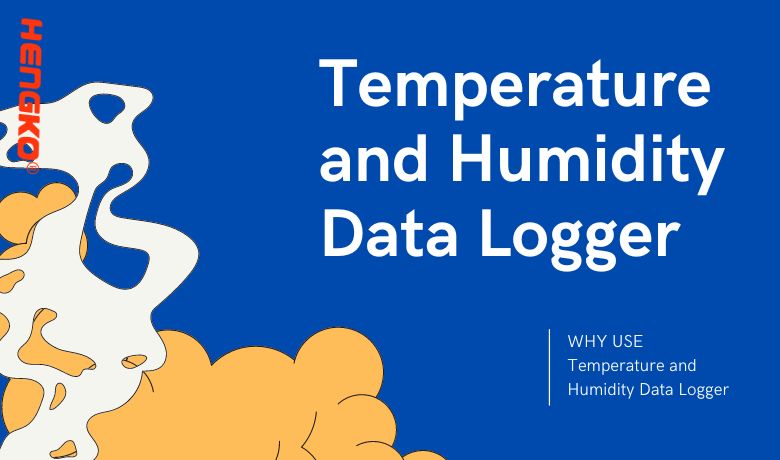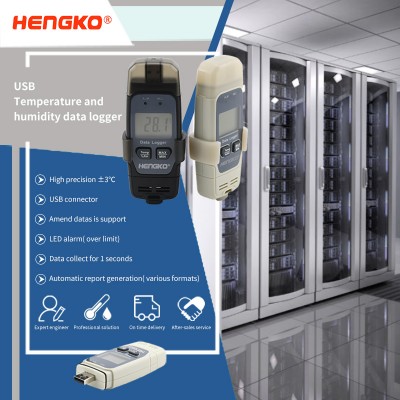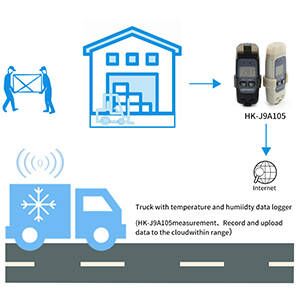
Why Temperature and Humidity Data Logger is So Important ?
With the quickly development of industry in recently, data logger has become the important tool. The temperature and humidity recorder can store and record the temperature and humidity changes during production and transportation at any time, and can output tables through professional PC analysis software, which helps enterprises to conduct more scientific and effective management, analysis, and induction, and greatly improves the work process and efficiency.
The using of temperature and humidity data logger are widely. In testing, certification, household appliance industry, network, cold chain transportation( vaccine/ food/fresh),museum heritage protection, archives management, agriculture, medical and health facilities. How does it work in those industry? Let’s learn it.
Application of Temperature and Humidity Data Logger
In IT, the computer is critical. It’s the core of data Processing Center, many data centers run hundreds or even thousands of hosts to process data at the same time. Their temperature will be very high in such long time high speed operation. As we all know, highly temperature will affect the precision of electronic components. Therefore, the temperature monitoring of machine room is important. HENGKO machine room temperature and humidity data logger , A compact performance that is ideal for a confined space such as a machine room. The product can store 16000 pieces of data and provide USB transmission interface. The user only needs to insert the recorder into the USB port of the computer. Through the matching Smart Logger software, the collected and recorded data can be transmitted to the computer for processing.

In museums and archives, there are often many copies, copybooks and archives stored, and the influence of temperature and humidity on paper is great. Once the temperature and humidity conditions are not up to the requirements, the paper will become brittle and easily damaged. The use of temperature and humidity recorder will simplify the work of temperature and humidity recording, will also save costs, improve work efficiency.

Main Feature and Function of Temperature and Humidity Data Logger
The main feature and function of a temperature and humidity data logger are to monitor and record environmental conditions, specifically temperature and humidity, over a period of time. These devices are commonly used in various industries and applications to ensure optimal conditions are maintained, and to gather valuable data for analysis and decision-making.
1. Temperature Monitoring:
The data logger continuously measures and records the ambient temperature of the surroundings. This is crucial in many scenarios, such as monitoring the temperature in laboratories, cold storage facilities, transportation of perishable goods, or even in climate-controlled environments.
2. Humidity Monitoring:
Along with temperature, the data logger also measures and logs the relative humidity of the environment. Humidity is vital in industries like agriculture (to monitor greenhouse conditions), manufacturing (for proper material handling), and museums/art galleries (to protect valuable artifacts).
3. Data Recording:
The data logger stores the collected temperature and humidity readings at regular intervals. The interval can usually be set by the user based on their specific needs. The recorded data can be retrieved later for analysis and evaluation.
4. Data Storage:
Depending on the model and capacity, the data logger can store a significant amount of data. Some advanced loggers may have internal memory, while others might have options for external memory cards or cloud-based storage.
5. Time-Stamping:
Each recorded data point is usually accompanied by a timestamp, allowing users to track changes over time and identify patterns in the environmental conditions.
6. Data Visualization and Analysis:
The data gathered by the logger can be downloaded and visualized through dedicated software or applications. This helps users to analyze trends, fluctuations, and anomalies in temperature and humidity, aiding in making informed decisions and adjustments.
7. Alarm Notifications:
Some data loggers come with alert functionalities, which can trigger notifications (email, SMS, etc.) when predefined temperature or humidity thresholds are exceeded. This feature is essential for critical applications where immediate action is necessary to prevent damage or ensure safety.
8. Battery Life:
Data loggers are designed to be energy-efficient and have a reliable battery life to ensure continuous operation during extended monitoring periods.
9. Durability and Portability:
Many data loggers are compact, portable, and designed to withstand harsh environments, making them suitable for various field applications.
In summary, a temperature and humidity data logger is a valuable tool for monitoring, recording, and analyzing environmental conditions, providing essential insights for a wide range of industries and applications.
What We Should Care About High Temperature and High Humidity
High temperature will damage the vaccine/ food/ fresh cold chain transportation.
Furthermore, when the humidity level is between 95%RH-91%RH, there is a higher likelihood of the growth of harmful microorganisms such as Salmonella, bolindella, lactic acid bacteria, molds, and yeasts due to the fluctuation in temperature.
HENGKO vaccine/ food/ fresh transportation temperature and humidity IOT solution achieve seamless monitoring of the whole process of product transportation, real-time display, automatic alarm, data analysis and other functions, in line with the quality management system and supervision methods of different enterprises, to achieve automatic, information and intelligent monitoring. HENGKO has a rich experiences formulated temperature and humidity monitoring programs for many industries, professionally providing hardware support and technical support, saving time and worry.
There is no doubt that temperature and humidity data loggers plays different effect in various industries, is a widely using measuring instrutment. Early temperature and humidity recorder is a paper type, called paper temperature and humidity recorder. With the continuous development of the Internet, the popularization and wide application of computers, the birth of paperless temperature and humidity recorder. And the paperless temperature and humidity recorder can more accurately record data, more convenient data storage, more convenient data analysis function, gradually also produced a paperless temperature and humidity recorder with USB interface, greatly convenient data download and preservation.
We believe with the technology developing in the future, there will various types temperature and humidity data loggers.
How to Choose Right Temperature and Humidity Data Logger for Your Application ?
If you are looking for some humidity data logger for your device, and want to Choosing the right temperature and humidity data logger for your application involves considering several important factors to ensure it meets your specific needs and requirements. Here's a step-by-step guide to help you make an informed decision:
1. Identify Your Application Needs:
2. Measurement Range and Accuracy:
3. Data Logging Interval:
4. Memory Capacity:
5. Data Retrieval Method:
6. Power Source and Battery Life:
7. Durability and Environment Suitability:
8.Software and Compatibility:
9.Calibration and Certification:
By carefully considering these factors, you can select the most suitable temperature and humidity data logger for your application, ensuring accurate monitoring and reliable data collection.
Ready to get started with HENGKO's temperature and humidity data loggers?
For any inquiries or to discuss your specific application needs, don't hesitate to reach
out to us at ka@hengko.com. Our team of experts is here to assist you and provide the best solutions for your monitoring requirements.
Contact us today and take the first step towards ensuring optimal environmental conditions in your industry or application. We look forward to hearing from you !
Post time: Jun-19-2021





